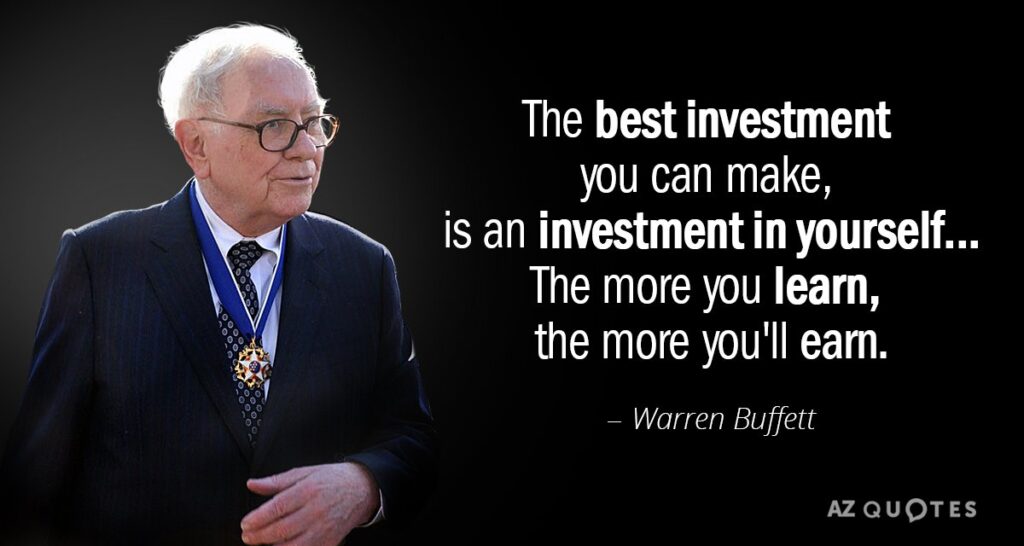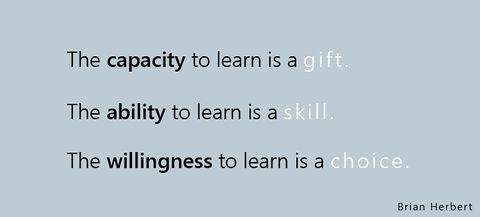Before I was 16, I had figured out that if I ever wanted to go to college, I needed to start earning money and saving it pronto. So, I got a job at a local pizza establishment and making money had never been so much fun even though I still had to take out loans at high interest rates (10%.)
Other jobs during summer breaks offered no enjoyment whatsoever so I figured out how to flee from them as soon as possible to find more of what I wanted and still pay off the student loans.

Get an education, learn new skills and improve your talent in whatever job you do. However, if you have no idea what to do with the increasing supply of money you earn and continue to spend it on everything you believe will make you happy, that investment (not you) becomes worthless. You will be left with little, nothing or even worse, a deficit.
The single most important performance measurement we all fixate on including companies is revenue or income. Even I did it on my About section when I first started this website several years ago having left the corporate world. I managed 250+ million as a Financial Controller. Revenue, that is, not profit or net income. If you don’t factor costs in at the same level of importance, you won’t build anything that has worth or is sustainable.
Take it a step further in that your best investment is an education in yourself to keep the treasures you have, find and build secure. Find what you want then how to get and keep that. We all know this isn’t a subject, not just a class, but an entire subject in any school curriculum. It must be studied in other ways and learned throughout our lifetime.
I always cringe when I hear or read recent graduates say, “I’ll never have to study again!”

Money in itself isn’t fulfilling. It is a tool, a resource or a means to things we need and value that can bring us happiness.
1. Security – shelter, clothing, food, health, insurance
2. Mobility – access to transportation, your own vehicle, adaptability of how and where you work
3. Reward – purpose, connection, appreciation, respect, confidence, satisfaction, significance, belonging
4. Amenity – more space, more privacy, more security, more choices
5. Flexibility – greater discretion on how or where you work, what you do, travel, freedom of your time
6. Legacy / Gratuity – to pass on or to give back
7. Luxury – a condition of abundance or great ease and comfort
If you are paying attention, you’ll notice the subtlety that Reward is different from the rest, in more ways than one. It can only be defined, felt and realized by you.
Luxury could be your ultimate goal, but will it continue to be rewarding and provide purpose for your life? Will it make your life rich? After Reward, the rest is all secondary.
Can Money Really Buy Happiness? | Psychology Today
The Secret To Happiness (…Has Nothing to Do with Money) (financialmentor.com)
Your best investment: An education in yourself to keep the treasures you have, find and build secure
- Figure out what you want in life, what makes you feel rewarded (happy.) Then learn how to get and keep that.
- Read and Study – books, articles. The abundance and access to information is like never before.
- Experience – do a job rotation, change jobs, freelance, find hobbies, go to events, volunteer, travel.
- Learn about economics, how supply and demand work and that an endless supply of money will not solve your problems.
- Listen to Podcasts and watch videos on YouTube but with skepticism. My husband does this to get ideas. They don’t tell the whole story and can get you into a less-than-optimal situation (personal experience.)
- Take an online course on Personal Finance or Investments at Texas Tech, Kansas State. I did a few years ago and learned a lot.
- Understand the concept of compounding and rate of return.
- Understand debt, interest rates and how much you will actually pay over the course of the loan and how long it will take you to pay off in the future.
- Understand what ROI (Return on Investment) is. If you are investing money or time into something that isn’t positively benefitting you or someone you treasure in some manner, there is no return on that investment.
- Know that you must earn more than you spend – this seems so obvious on the surface but what people don’t consider and don’t calculate, or track is their Net Worth. Believe me, it is pretty depressing when it’s consistently negative which many people don’t want to know or face.
Net Worth ≠ Self Worth
Net Worth ≠ Income
Net Worth = Assets – Liabilities - Pay Attention to your costs especially that most are now automated. Credit card transactions and subscriptions are the worst. With an app or online, it has never been easier to track your personal finances. The most I have ever learned was when I realized I hadn’t been paying attention.
- Envision your future, automatically contribute to your 401(k), IRA, savings and track your investments. Since you pay the government first, you should pay yourself second. Everything else is a third-party and you don’t want to be the last party getting the crumbs.
- Learn how to do as much as you can with what you have. Example: Our house in CA had popcorn ceilings, a 60’s bathroom and a 70’s kitchen. I asked a realtor to prioritize what we should spend money on. Popcorn ceilings didn’t matter for resale, and she was right.
- Share household financial responsibilities and decisions. Switch responsibilities so that you both have an understanding of everything involved.
- Compare your financial progress and net worth against previous years, not to others.
- Hire true professionals – vetted CPA’s, CFP’s/Financial Planners / Advisors, Estate Planning Attorneys but be an active participant in understanding why and how. We do not know it all. Even the professionals don’t know it all.
You and who you share life with are the only ones who know your financial circumstances in its entirety. No one else does or will. The same is true for what you treasure in life. Only you know what that is.
Financial Mentor, Todd Tresidder, has large amounts of free content and resources on his website. I took one of his online courses. At first glance, it can appear very high level but once you start reading, it isn’t. 7 Reasons Why Financial Education Is Your Best Investment (financialmentor.com)
Warren Buffett’s latest advice includes understanding the principles of accounting as they provide invaluable insights into a company’s (or your) (net) worth and progress. Warren Buffett’s Advice for Millennials | GOBankingRates
If you want a laugh, some of the synonyms I found for pronto are hilarious, but I didn’t change it. What is another word for pronto? | Pronto Synonyms – WordHippo Thesaurus


